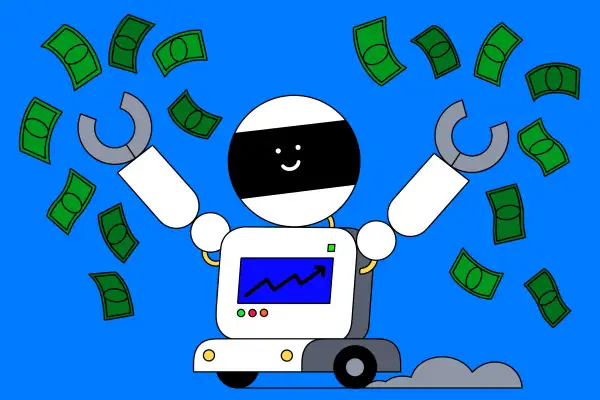AI Stocks Are on a Tear — and Experts Say It’s Not a Bubble
Money is not a client of any investment adviser featured on this page. The information provided on this page is for educational purposes only and is not intended as investment advice. Money does not offer advisory services.

The stock market is soaring this year, and much of those gains are thanks to the excitement surrounding artificial intelligence.
Chipmaker Nvidia's stock is up more than 200% this year, and artificial intelligence (AI) software provider C3 AI's stock is up more than 250%. Stocks of other companies that are putting resources towards AI have jumped, too: Microsoft is up 40%, and Google parent Alphabet is up 37%. Those gains have helped push the S&P 500 index, which is often used as a benchmark for the stock market as a whole, up about 14% in 2023.
For more seasoned investors, these soaring tech stock prices may be reminiscent of the dot-com bubble of the early 2000s. In equities markets, bubbles happen when overvalued assets soar to unsustainable highs before the bubble "pops" and prices fall back down to Earth.
Analysts at Bank of America recently categorized the rise in AI stocks as a "baby bubble." Bubbles are "always started by easy money," they wrote, and "always ended by rate hikes," pointing out that another rate hike from the Federal Reserve is certainly possible this year.
But overall, many market watchers say AI stocks likely aren’t in a bubble headed for a pop.
Are AI stocks in a bubble?
The analysts at Bank of America aren’t alone in their concern, and while there is no way to know for sure, many experts say investors likely don’t need to worry about the type of bubble that has disrupted the stock market in past decades.
“We do not believe what we are seeing today is the equivalent of the tech bubble in the late 90s or in the leverage-driven nature of the market leading up to the [financial crisis],” says Kevin Philip, partner at Bel Air Investment Advisors.
He notes that companies in today’s market have much stronger fundamentals than they did in either of those instances.
"It's not a bubble," Chris Harvey, head of equity strategy at Wells Fargo Securities, recently told CNBC. He argues that valuations and earnings expectations for AI today are more realistic than they were for early internet companies in the late 1990s, and that companies have immediate commercial uses for AI tech.
Will AI stocks keep soaring?
Bubble or no bubble, most experts agree that while artificial intelligence isn't going anywhere, it's still very early in the development of the technology. That means investors should expect some bumps along the way.
“AI is a game changer,” says Liz Young, head of investment strategy at SoFi. “It's something that's going to change industries, but it's pretty early in the lifecycle… we just don't know which companies are going to be good at it and which ones are not.”
In other words, the companies that are successful at implementing AI today might not be the same companies that are successful next year, or five years from now.
“In the case of any emerging technology or innovation, stocks that benefit do not typically go up without pause,” Philip says. He anticipates a pullback at some point as investors’ overenthusiasm wanes. He adds, however, that certain major companies (think Microsoft or Nvidia) will have an advantage in the short-term because they have more resources than smaller companies.
Other experts are urging investors to be cautious. When a very small number of stocks (in this case, mega cap tech stocks) are leading a rally while the rest of the market underperforms, it can be a cause for concern.
As the industry matures, Young says investors should expect “a few ups and downs,” especially in the short term. “The chances of going on an unbelievably violent roller coaster ride in these super high-valued tech names are higher” in the near-term, she says.
Philip recommends that investors looking for AI exposure learn about the practical implications of the technology and how it might impact the economy. Other experts recommend investing across a wide range of companies in the industry rather than just a handful. That way, you won’t lose out if today’s successful names aren’t as promising tomorrow.
More from Money:
Everyone Wants to Invest in AI. Here's the Best Strategy

